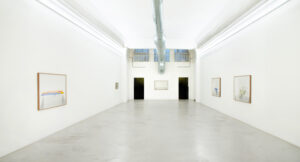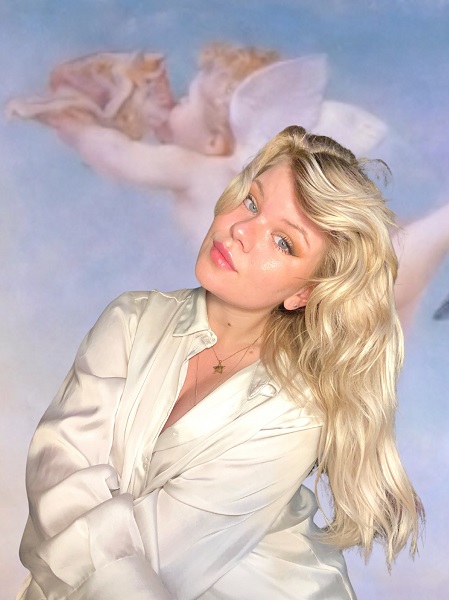On January 13, 2024, LABS Contemporary Art unveiled the curtain on Giulia Marchi‘s second solo exhibition, Bildungsroman. This exhibition represents a photographic exploration of the concept of formation, drawing from the artist’s rich intellectual journey and navigating precisely through literature, painting and cinematography. Marchi’s work’s sophistication distinctly emerges through a skillful use of fabrics, shaping her research and reflecting on a broad spectrum of inspirations ranging from Antonello da Messina (Annunciation of Palermo, 1475) to Virginia Woolf, the author of Orlando (1928).

Giulia Marchi, Bildungsroman, installation view at LABS Contemporary Art, courtesy LABS Contemporary Art.
This conjunction of intellectual and material investigation not only further layers complexity but elevates Bildungsroman to a level of multisensory experience, even touching on the spiritual side. The visitors not only immerse themselves in a visual contemplation of the artwork but engage in cognitive effort, extracting from their mnemonic archive and experiencing the echoes of memories. This interaction makes the approach to the works a magnetic and polysensory experience, emphasizing the cognitive and emotional dimensions of the observer in the context of its creation. The meticulous selection of fabrics, in addition to weaving a refined dialogue with artistic tradition, stands as an interpretative key to her vision. In this interweaving of past and present, a sophisticated visual narrative on artistic formation manifests, revealing meanings that defy temporal and narrative linearity.

Giulia Marchi, Bildungsroman, installation view at LABS Contemporary Art, courtesy LABS Contemporary Art
In the aseptic context of the gallery, the five works displayed in the entrance hall harmoniously blend with the surrounding space, creating an environment conducive to reflection and asceticism. Perspective-wise, on the back wall, Time and Void, Gilles Deleuze, 1985 stands out, a white and empty altar veiled by a rubberized fabric simulating the texture of paper, assuming the appearance of a point of origin or perhaps cyclically, a destination. Converging into the void of infinite possibilities. The altar, in a chromatic twist, welcomes the refined polychromatic mantle of the Annunciation of Palermo, Antonello da Messina 1475, where the essential geometry of the mantle transforms into an impeccable delineation of naturalness that seems to almost slide from Mary’s face, imbuing the work with mysticism.

Giulia Marchi, Bildungsroman, installation view at LABS Contemporary Art, courtesy LABS Contemporary Art
Nearby, the presence of Bartolomeo Apostolo, El Greco, is distinguished, where the artist, through the manipulation of fabrics with various weights and flexibilities, has delicately evoked from her memory the Apostle’s cloak. This work, solemnly elevated above the void of the altar, is enveloped in a white purity that, despite its structured rigidity, suggests fluidity and sculptural grace in its textile composition. The intricate fabric weave unfolds like an embrace, offering the viewer the sensation of glimpsing, through ethereal layers, the underlying corporeality.

Giulia Marchi, Battesimo di Cristo, Masolino da Panicale, Castiglione Olona (1410-1480), 2023, Giclée print on Canson Infinity Rag Photographique cotton paper (310gr), courtesy LABS Contemporary Art
Moving towards the opposite wall, we encounter The Transport of Christ, Pontormo. Rolls of fabric lie, wrapping and recalling Pontormo’s egg tempera, with the azure on the Madonna’s mantle, the pink of the skin tones painted with layers of white lead and cinnabar and the orange of the garments in motion. Through a historical and cultural mastery, the artist manages to condense a complex work, reaching the essential, what remains in memory, what his mind has transfigured into corporeality.

Giulia Marchi, Annunciata di Palermo, Antonello da Messina, Palermo (1475), 2023, Giclée print on Canson Infinity Rag Photographique cotton paper (310gr), courtesy LABS Contemporary Art
Approaching the essence more and more, we face The Baptism of Christ, Masolino da Panicale, with its flow of brilliant green fresco reminiscent of the Jordan River waters. This surge of color infiltrates between the depicted rugged mountains, surrounding the figure of Christ receiving baptism. A stream of fabric, evoking the course of the Jordan itself, unfolds on the altar, only to return to the starting point, the starting wall, the void. This marriage of artistic references, embracing different periods and genres, translates into a work that transcends time, offering the audience a visually immersive experience with deep connections to the past and a contemporary view of the Bildungsroman process.
Info:
Giulia Marchi. Bildungsroman
13/01 – 2/03/2024
LABS Contemporary Art
Via Santo Stefano 38, Bologna
www.labsgallery.it

Born in 1999. She falls in love with art by looking at her mother’s paint. She’s studying History of Art at the Ca’ Foscari University (Venice) and in the meantime divulges online videos of art pills. She deals with contemporary art as a critic, curator and artist.






NO COMMENT